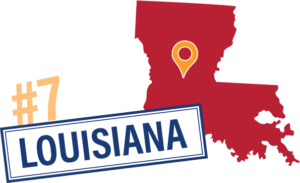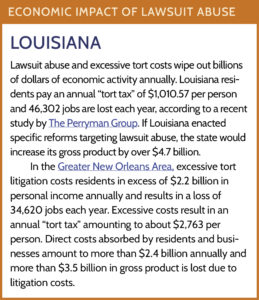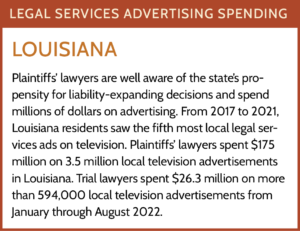COASTAL LITIGATION
Since 2013, Louisiana courts have had their hands tied with coastal litigation. Louisiana parishes have sued Exxon Mobil, Chevron, and more than 200 energy companies alleging that their operations have dam- aged coastal marshes and wetlands. Coastal litigation has had enormous implications for the state’s energy industry with the potential to dish out billions of dollars in damages.
Seeking home field advantage
There is no end in sight to this litigation. Last year, U.S. Court of Appeals for the Fifth Circuit partially reversed an earlier decision that had kept 42 lawsuits filed by six Louisiana parishes in state court. The federal appellate court found that the oil and gas companies had filed a timely request to remove the cases to federal court soon after it became apparent that the parishes had sued the companies for actions they took during World War II while acting under the authority of a federal wartime agency.
After the Fifth Circuit returned the case to the federal district court, however, Judge Martin Feldman
of the Eastern District of Louisiana ruled that the state’s 25th Judicial District Court in Plaquemines Parish should decide the bellwether Plaquemines Parish case. While the removal request was timely, the district court found that the companies’ compliance with federal regulations was not enough to show that they were directly “acting under” the direction of a federal officer, which would have provided jurisdiction in federal court.
This issue is now again before the Fifth Circuit. During oral argument, this August in Plaquemines Parish v. Chevron USA, Chevron’s attorney, Peter Keisler, argued that a remand to state court would rob oil companies of the opportunity to present a federal defense that arises directly out of their relationship with the government. Keisler cited WWII-era directives that demanded oil producers drill and extract excess oil to support the war effort. In order to meet the oil production quotas, companies contend that the federal government directed them to ditch their best practices and overlook the damage that the excessive drilling would cause the coastal marshes.
Detrimental effects on economy
These lawsuits have a tremendous impact on Louisiana’s economy, affecting an industry with more than 250,000 workers. As the home to one-fourth of the nation’s energy supply, the Louisiana natural gas and oil industry has a value exceeding $16 billion a year. Louisiana Oil & Gas Association President Mike Moncla said, “since the beginning of the coastal litigation process, the oil and gas industry in Louisiana has been on the decline. These frivolous lawsuits have hurt jobs, bankrupted marine service companies and operators, and have decimated the state’s tax revenue it receives from energy production.”
These unfounded lawsuits continue to drive jobs and investment away from Louisiana. In fact, a 2019 study found that two years after the lawsuits began, 2,000 job losses were directly attributable to the impact of the litigation risk. While proponents of the lawsuits claim they will help bring resources to rebuild Louisiana’s coastline, this litigation stifles job creation while doing little to nothing for the coast.
Settlement on the horizon?
After about a decade of time-consuming and expensive litigation, some companies are considering settlement. Last year, Freeport McMoRan agreed to pay $100 million over 20 years to end the lawsuits. About
$23.5 million of the money is intended to fund coastal restoration projects, however, these funds would be controlled by a new unelected bureaucracy called the Coastal Zone Recovery Authority (CZRA), which has broad power to direct funds to non-restoration-related projects. Critics fear that the settlement leaves a large percentage of the dollars in unrestricted funding buckets, which may be used for efforts that have nothing to do with restoring the coast. They call it a political slush fund.
There are already indications that the settlement is unraveling. As of September 2022, at least four of the twelve coastal parishes that must sign off on the Freeport-McMoRan settlement have rejected the deal. Meanwhile, the state legislature has twice declined to approve legislation that would establish the CZRA, doubting the benefit of the litigation to the environment and public.
As a critic of the litigation, Pelican Institute CEO Dan Erspamer, observed, “Momentum is building toward what should be the goal: End the suits and get back to the hard work of coming together to protect our environment and create jobs for our people.”
 Louisiana has made strides over the past few years, but there is still work to be done if it wants to escape the Judicial Hellholes® list once and for all. Meritless coastal litigation continues to bog down the state’s economy and drive jobs to neighboring states. Judges make headlines for all the wrong reasons and the state has opened the floodgates for COVID-19 litigation that has been stymied by other states.
Louisiana has made strides over the past few years, but there is still work to be done if it wants to escape the Judicial Hellholes® list once and for all. Meritless coastal litigation continues to bog down the state’s economy and drive jobs to neighboring states. Judges make headlines for all the wrong reasons and the state has opened the floodgates for COVID-19 litigation that has been stymied by other states.






